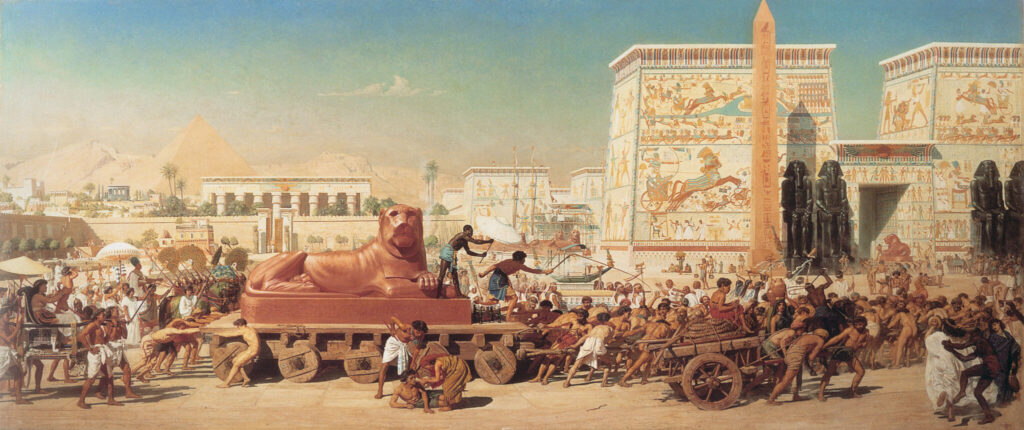
There is something startling about the Israelites’ memory in Sefer Bamidbar. No sooner do they find themselves in the discomfort of wilderness life—hungry, uncertain, and afraid—than they begin to long for the very place that enslaved them. “We remember the fish that we ate in Egypt for free,” they say in Bamidbar 11:5, “the cucumbers, the melons, the leeks, the onions, and the garlic.”
It is one of the more jarring moments in the Torah—not because it reveals weakness, but because it reveals distortion. Egypt, the site of brutal oppression and genocidal decrees, has been reimagined as a place of abundance. Of comfort. Of “free food.” The past has been romanticized. The trauma has been blurred. The slavery has been edited out.
The Midrash Tanchuma (Beha’alotcha 11) reads this passage with palpable disbelief: “Was it really free? Did they not suffer the harshest slavery?” The Midrash concludes, “This teaches that with every hardship, they forgot the suffering of the body.” The Israelites were not just craving garlic and leeks—they were reinterpreting slavery as security. That is the danger. Not only the forgetting of history, but the selective remembering of it.
What we are witnessing is not merely ingratitude, but a psychological phenomenon as old as humanity: nostalgia as a response to fear. As Ramban notes in his commentary on this verse, the people were not just complaining about food—they were rejecting the manna, the miraculous nourishment that symbolized trust in God. They were pushing away the very experience that was supposed to mature them spiritually.
And the truth is, they are not alone in that tendency. Faced with uncertainty, human beings retreat into idealized versions of the past. We crave familiarity. We inflate what was good and forget what was unbearable. This tendency—understandable as it may be—becomes spiritually dangerous when it obstructs our ability to move forward.
In Bamidbar, nostalgia is not benign. It becomes corrosive. It undermines leadership, fuels rebellion, spreads discontent, and ultimately delays the entire journey to the Promised Land. A generation dies in the desert because they could not distinguish between memory and imagination.
The Mechilta de-Rabbi Yishmael (Bo 14) warns us: “There is no person more enslaved than one who thinks slavery is freedom.” That is Egypt. Not just a place, but a psychological condition. A state in which dependence is mistaken for security, and submission for peace. Rabbi Jonathan Sacks z”l called it the “Egypt of the mind.”
And if we are honest, we still carry that Egypt. Not literally, but symbolically. We speak of “the good old days” of Jewish life in America—the postwar flourishing of synagogues, the golden age of institutional influence, the long arc of upward mobility and cultural acceptance. But idealizing that era risks forgetting what was already fraying: declining observance, rising assimilation, and the cost of fitting in quietly.
We pine for the cucumbers and garlic of respectability, forgetting the compromises it required. Egypt was never as good as we remember. We’ve simply grown afraid of what lies ahead.
The parallel to our moment is stark. In the wake of October 7, the Jewish world has been shaken. There is real fear, and a sense that old assumptions—about safety, about power, about moral clarity—no longer hold. Our institutions struggle to speak with courage. Our youth feel exposed on campuses. Many Jews feel abandoned by the very societies they once trusted.
In such a moment, the temptation is strong to withdraw. To long for the comfort of what once was. But the Torah insists that while Egypt may be familiar, it is not our future.
The wilderness is hard—but it is holy.
As the Sefat Emet (Bamidbar 5642) teaches, the desert is hefker—ownerless. It is precisely in that unclaimed, vulnerable space that revelation can occur. Only when we relinquish certainty and control can something sacred emerge. Egypt gave the Israelites routine and predictability. The wilderness offered risk—but also possibility.
This insight is echoed in Rabbi Joseph B. Soloveitchik’s Emergence of Ethical Man*, where he writes that the slave in Egypt was “not only beaten externally but degraded internally.” The journey to freedom, he insists, is not geographic—it is ethical. It is the process of reclaiming dignity. Nostalgia, then, is not a simple memory. It is a rejection of agency.
This is the central tension of Bamidbar: the pull backward vs. the call forward. The Israelites say, “Let us return to Egypt.” God says, “Move.” The ones who listen to their fear remain behind. The ones who listen to their faith step into destiny.
And that brings us to the final and most painful truth. Bamidbar does not end with resolution. It ends in waiting. In wandering. Because not everyone can let go of Egypt. Not everyone is ready to live with uncertainty and still choose covenant. An entire generation must pass before the people are ready to cross the threshold into promise.
It is a sobering reminder for us.
We cannot build a Jewish future by clinging to myths of the past. Nor can we afford to wait until everything is certain and safe. The wilderness is where peoplehood is born. It is where truth is tested. And it is where we are called—not to remember falsely, but to act faithfully.
Pirkei Avot 2:4 tells us, “Do not separate yourself from the community.” Nostalgia can be a form of separation. A way of standing apart and saying, “It used to be better.” The Torah demands something harder: showing up, even in the desert. Being present even when it’s painful. Choosing vision over regression.
“We remember the fish…” But memory alone is not enough. In the Jewish story, those who turn back perish in the wilderness. It is those who move forward—uncertain but faithful—who inherit the land.
Leave a Reply